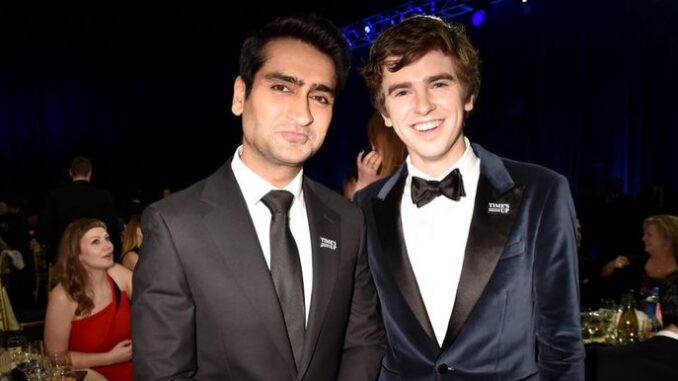
Freddie Highmore’s journey through Hollywood is a compelling narrative of talent, resilience, and evolution. From his early days as a captivating child actor to his current status as a globally recognized star, Highmore has consistently demonstrated an extraordinary range and depth. His portrayal of Dr. Shaun Murphy in “The Good Doctor” stands as a pivotal moment in his career, solidifying his position as one of the most compelling actors of his generation.
Highmore first captured hearts and imaginations in the early 2000s. Films like “Finding Neverland” (2004) and “Charlie and the Chocolate Factory” (2005) showcased a prodigious talent far beyond his years. In “Finding Neverland,” his nuanced performance as Peter Llewelyn Davies, a young boy grappling with loss and imagination, earned him critical acclaim and numerous awards nominations. He held his own opposite Johnny Depp and Kate Winslet, proving he was more than just a cute face; he possessed a profound ability to convey complex emotions with authenticity. This early success wasn’t a fluke. His role as the earnest and morally upright Charlie Bucket in Tim Burton’s “Charlie and the Chocolate Factory” further cemented his status as a sought-after child actor. Highmore brought a grounded humanity to the fantastical world of Willy Wonka, making Charlie relatable and endearing. These early roles set a high bar, establishing him as a young actor with immense potential.
As he transitioned into adolescence and early adulthood, Highmore deliberately chose roles that allowed him to explore darker and more complex characters, avoiding the pitfalls often associated with child stars struggling to find their footing. His five-season run as Norman Bates in A&E’s “Bates Motel” was a transformative period. Taking on the iconic role from “Psycho,” Highmore delivered a chillingly brilliant performance, meticulously detailing Norman’s descent into madness. This role was a significant departure from his earlier innocent characters, showcasing his versatility and willingness to push boundaries. He not only acted but also ventured into writing and directing episodes, demonstrating an emerging multi-faceted talent. “Bates Motel” proved that Highmore was not merely a former child star, but a serious dramatic actor capable of carrying a complex narrative.

The culmination of his artistic growth and a defining moment in his career arrived with “The Good Doctor.” Highmore took on the challenging role of Dr. Shaun Murphy, a young surgeon with autism and Savant syndrome. This character demanded immense sensitivity, meticulous research, and an extraordinary level of commitment. Highmore’s portrayal of Shaun is nothing short of masterful. He avoids stereotypes, instead presenting Shaun as a fully formed individual with unique strengths, vulnerabilities, and a profound capacity for empathy. His physical mannerisms, vocal inflections, and emotional expressions are all carefully calibrated to convey Shaun’s internal world. The series has been a global phenomenon, resonating with audiences worldwide and bringing critical awareness to autism spectrum disorder. Highmore’s performance is the bedrock of the show’s success, earning him widespread critical acclaim, including a Golden Globe nomination.
“The Good Doctor” hasn’t just been a showcase for Highmore’s acting prowess; it’s also allowed him to expand his behind-the-scenes contributions. He serves as an executive producer on the show and has written and directed several episodes, further illustrating his comprehensive understanding of storytelling and production. This expansion of his roles reflects a mature artist who is deeply invested in the creative process beyond just performing.
Freddie Highmore’s journey from a bright-eyed child actor to a revered global sensation is a testament to his unwavering dedication to his craft. He has navigated the treacherous waters of Hollywood with grace, making astute career choices that have allowed him to grow and evolve. His work in “The Good Doctor” is not just a role; it’s a testament to his ability to bring complex characters to life with authenticity and humanity, securing his place as one of the most respected and admired actors of his generation. His story serves as an inspiring example of sustained success built on genuine talent and continuous artistic development.
